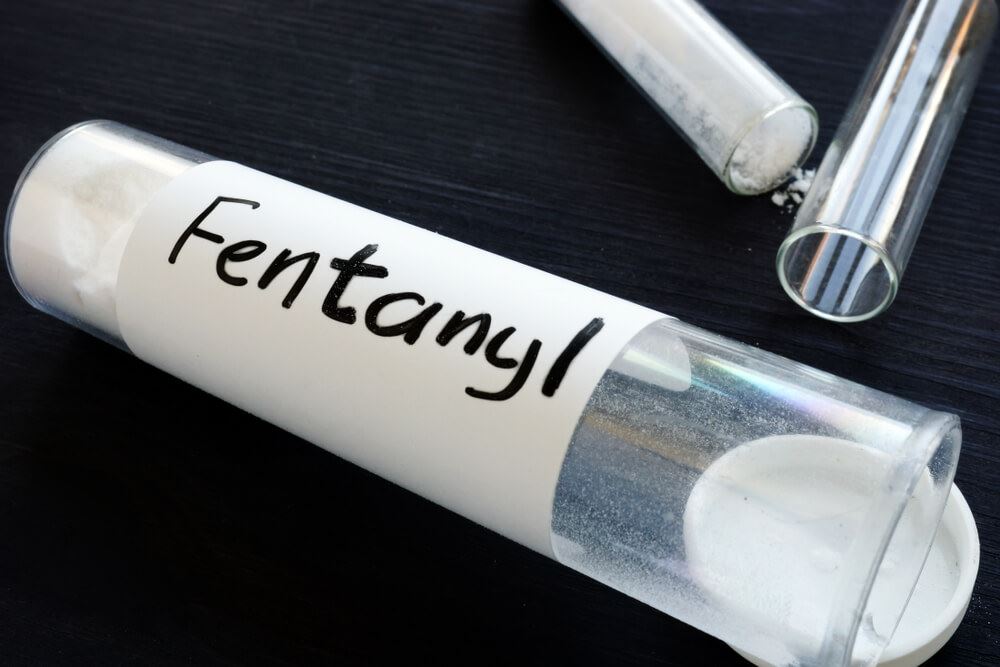

Working To Make Your Recovery Affordable By Accepting Most Insurances
Do not be discouraged if you are not seeing your insurance provider listed on our website. We take many types of insurance! Call Today: (844) 292-5010
-
 In-Network: BCBS
In-Network: BCBS -
 In-Network: Aetna
In-Network: Aetna -
 In-Network: Tricare
In-Network: Tricare -
 In-Network: Cigna
In-Network: Cigna -
 Proudly Caring for Veterans
Proudly Caring for Veterans -
 In-Network: Carelon
In-Network: Carelon -
 In-Network: MultiPlan
In-Network: MultiPlan -
 In-Network: HMC
In-Network: HMC
Fentanyl Addiction Treatment in Prescott, AZ
Evidence-Based Fentanyl Addiction Treatment
Fentanyl is one of the strongest opioid drugs on the market as well as one that is shorter-lasting than some of the other well-known drugs, which is a deadly combination for addicts. Fentanyl is often used after surgery or for pain that breaks through beyond the normal opioid that a chronic pain sufferer takes. It also is available for time-release, providing strong pain relief over time. These factors create a dangerous effect for drug use disorder sufferers, because the chances of overdosing are extremely high.
If you or someone you love is addicted to fentanyl, there is no time to wait. You need to seek rehabilitation before it is too late. Our team of opioid addiction specialists at Decision Point Center can be your guide in recovery.
On This Page:
- About Decision Point Center
- Symptoms of Fentanyl Addiction
- Signs of Fentanyl Addiction
- How to Help Someone Addicted to Fentanyl
- Fentanyl Rehab FAQs
- Contact Our Arizona Fentanyl Rehab Center Today
Your life is worth so much more than living in the grip of a drug. Contact us today for more information about our Arizona fentanyl rehab center.
Our Prescott fentanyl rehab center offers a safe place for people who abuse or are addicted to opioids, helping the break their habit in a comfortable and controlled environment.

 Our professional staff understands that there is no such thing as a one-size-fits-all style of treatment, which is why we take the time to learn about your unique situation and the potential challenges to recovery in order to develop the best possible treatment. We can also help you manage psychological symptoms whenever you experience withdrawal symptoms and suffer from any pre-existing mental health conditions.
Our professional staff understands that there is no such thing as a one-size-fits-all style of treatment, which is why we take the time to learn about your unique situation and the potential challenges to recovery in order to develop the best possible treatment. We can also help you manage psychological symptoms whenever you experience withdrawal symptoms and suffer from any pre-existing mental health conditions.
We provide a Residential Inpatient program that consists of various therapeutic approaches and modalities such as Cognitive Behavioral Therapy (CBT), Dialectical Behavior Therapy (DBT), Trauma Therapy, Family Therapy, and EMDR Therapy, followed by a comprehensive assessment. Since fentanyl is a powerful drug to overcome, we offer longer treatment through extended residential care that lasts an additional.
As with other opioid addictions, fentanyl’s signs and symptoms look much like a sedative. They also may be accompanied by a lack of care for oneself, possibly illegal activity, or apathy towards life in general.
If you or a loved one is exhibiting any of the following symptoms, it is time to seek help:
- Euphoria
- Drowsiness
- Mellowness
- Dry mouth
- Slowed breathing
- Itching/scratching skin excessively
- Loss of appetite
- Headache
- Insomnia or disrupted sleep patterns
- Vivid or bad dreams
- Sweating
- Water retention in extremities
Fentanyl is a drug that requires increased dosage rather quickly to achieve the same affect, and addiction typically sets in rapidly. It is imperative that you seek help as early and as diligently as possible to reduce risk of death or permanent damage from overdose.
Since many patients don’t believe opioid pain relievers (OPRs) such as fentanyl are not as addictive as heroin or other illegal drugs, there has been a significant increase in accidental and intentional abuse in recent years. Fentanyl substantially affects the central nervous system, causing an excessive flood of dopamine that chemically alters the brain as time goes on.
When patients experience such a neurochemical change, they ultimately become dependent. After exhausting their prescription, they often attempt to obtain fentanyl through illegal methods or even become addicted to heroin.
Building a tolerance for fentanyl’s narcotic properties can result in patients needing more of the drug to experience the sensations they felt when they started using it. Our professional staff can identify problematic behavior such as tolerance development or suffering withdrawal symptoms.
Fentanyl, a potent synthetic opioid, can cause various short-term effects when someone becomes addicted:
- Euphoria and Relaxation: Fentanyl produces intense feelings of euphoria and relaxation, which can be immediate upon ingestion. This can lead to a rapid onset of addiction as individuals seek to recreate these feelings.
- Drowsiness and Sedation: Users may experience extreme drowsiness and sedation, sometimes to the point of losing consciousness. This effect can be dangerous, especially if someone is operating heavy machinery or driving.
- Confusion and Disorientation: Fentanyl's impact on the brain can cause confusion and disorientation, impairing cognitive abilities and decision-making.
- Respiratory Depression: One of the most dangerous short-term effects is respiratory depression. Fentanyl can significantly slow down breathing rates, potentially leading to respiratory arrest or death, especially in cases of overdose.
- Nausea and Vomiting: Some users may experience nausea and vomiting shortly after taking fentanyl.
- Constipation: Opioids, including fentanyl, can cause constipation due to their impact on the digestive system.
- Tolerance and Dependence: With continued use, tolerance to fentanyl can develop rapidly, meaning higher doses are needed to achieve the same effects. This often leads to dependence, where the body becomes reliant on the drug to function normally.
Long-term fentanyl addiction can result in various severe and sometimes irreversible effects on both physical and mental health:
- Tolerance and Dependence Escalation: Long-term use often leads to increased tolerance, requiring higher doses to achieve the desired effects. Dependence becomes more profound, making it challenging to quit without experiencing withdrawal symptoms.
- Physical Health Effects: Chronic fentanyl use can damage multiple bodily systems. Respiratory problems persist and worsen, potentially leading to respiratory failure or other severe breathing issues. It can also weaken the immune system, making individuals more susceptible to infections.
- Cardiovascular Issues: Fentanyl abuse can cause heart problems, including irregular heartbeats, increased risk of heart attack, and potential damage to the cardiovascular system.
- Gastrointestinal Complications: Long-term opioid use, including fentanyl, often leads to severe constipation, which can result in bowel issues and complications.
Neurological Impact: Prolonged use of fentanyl can lead to changes in brain structure and function, affecting cognitive abilities, memory, and decision-making. Chronic use may increase the risk of developing neurological disorders. - Psychological Effects: Mental health issues can worsen with long-term fentanyl addiction. Anxiety, depression, and other mood disorders might become more severe or arise due to the substance abuse.
- Social and Behavioral Consequences: Addiction to fentanyl can lead to strained relationships, loss of employment, financial instability, and legal issues. The intense cravings and focus on obtaining and using the drug can lead to neglect of responsibilities and social isolation.
- Risk of Overdose: Long-term users are at a significantly higher risk of overdose due to the body's reduced sensitivity to the drug's effects. Overdose can result in respiratory failure, coma, or death.
Seeking professional help is crucial for individuals dealing with long-term fentanyl addiction. Treatment programs can help manage withdrawal symptoms, address underlying issues, and support individuals in their journey toward recovery.
There are few things more painful than watching someone you love struggle with an addiction to fentanyl. You do not have to be a trained medical professional or an addiction expert to play a meaningful role in your loved one's recovery.
If your spouse, parent, child, friend, or other loved one is abusing fentanyl, consider the following:
- Educate yourself as much as possible about addiction so you can truly understand what they are going through. The better you understand how these drugs affect a person's body and mind, the better prepared you will be to provide support.
- Do not delay. Promptly tell your loved one you are concerned about their wellbeing and urge them to seek treatment. Do not make the mistake of thinking that they need to hit "rock bottom" before getting help. You could be saving their life.
- Be careful with your tone. Approach them from a place of compassion, not judgment. They will be more receptive to your offers for help if they do not feel they are being shamed for their struggles.
- Understand that they may not seek help at first. Be persistent.
- If they refuse to acknowledge an obvious problem, consider staging an intervention with professional help.
- If they do decide to seek treatment, stay involved in their recovery journey. Attend meetings with them, check in with them regularly, and continue to offer your support. This is the time where they will need you the most.
Call us at (844) 292-5010 today or contact us online to learn more about fentanyl addiction treatment in Prescott, AZ.
Fentanyl Rehab FAQ
What Makes Fentanyl Addiction So Dangerous?
Fentanyl is an extremely potent opioid—up to 50 times stronger than heroin and 100 times stronger than morphine. Its strength increases the risk of overdose, especially when mixed with other substances. Because of its potency, even small amounts can cause severe addiction quickly. The rapid physical dependence it creates makes stopping without medical help highly dangerous due to severe withdrawal symptoms.
At Decision Point Center, we take fentanyl addiction very seriously and offer a comprehensive rehab program that focuses on both the physical and psychological aspects of addiction.
How Does Fentanyl Rehab Work at Decision Point Center?
Our fentanyl rehab program in Prescott starts with a medically supervised drug detox to manage the severe withdrawal symptoms associated with fentanyl use. During detox, our team monitors patients around the clock, offering medications when necessary to ease discomfort and ensure safety.
After detox, the rehabilitation process begins, which includes therapy, counseling, and holistic treatments designed to help you address the root causes of your addiction. We also provide education on relapse prevention and coping mechanisms to support long-term recovery. Our individualized approach ensures each person’s unique needs are met through customized care.
What are the common withdrawal symptoms experienced during fentanyl detox?
Fentanyl withdrawal symptoms can be intense and include severe muscle and bone pain, nausea, vomiting, diarrhea, intense cravings, anxiety, agitation, insomnia, sweating, runny nose, watery eyes, chills, and goosebumps. Medical supervision is crucial during detox to manage these symptoms safely.
What is the typical duration of medical detoxification for fentanyl?
The acute phase of fentanyl detoxification typically lasts between 7 and 10 days, though it can vary based on the individual's level of dependence and overall health. Medical supervision during this period is essential for managing severe withdrawal symptoms.
How effective is fentanyl addiction treatment in achieving long-term sobriety?
The effectiveness of fentanyl addiction treatment in achieving long-term sobriety is significantly enhanced by comprehensive, evidence-based approaches that include medical detox, MAT, behavioral therapies, and robust aftercare. While individual outcomes vary, consistent engagement in all phases of treatment and ongoing support significantly improves the chances of achieving a lasting recovery.
How Long Does Fentanyl Rehab Typically Last?
The length of fentanyl rehab can vary based on individual needs and progress. Detox usually lasts between 7 and 10 days, but the rehabilitation phase can take 30, 60, or even 90 days, depending on the severity of the addiction and whether there are any co-occurring mental health conditions. Longer treatment plans allow for a more comprehensive approach to recovery, giving patients the time needed to fully address the physical and emotional challenges of fentanyl addiction.
What Should I Do to Prepare for Fentanyl Rehab?
Preparing for fentanyl rehab involves both practical and emotional steps. Logistically, you may need to take time off work or secure arrangements for childcare or other responsibilities. Emotionally, it’s important to approach rehab with an open mind and a commitment to change. At Decision Point Center, we’ll guide you through the entire process, providing detailed instructions on what to bring and how to prepare for your stay. Being ready to engage fully in the program will significantly improve your chances of success.
Is Fentanyl Rehab Covered by Insurance?
Yes, many insurance plans cover fentanyl rehab, but coverage can vary depending on your policy. Decision Point Center works with a variety of insurance providers, and we can help you verify your benefits and understand what’s covered. If your insurance does not cover the full cost of treatment, we also offer payment plans and financing options to ensure you can get the help you need.
What Support is Available After Fentanyl Rehab?
After completing fentanyl rehab, continuing support is critical to maintaining long-term sobriety. At Decision Point Center, we offer a comprehensive aftercare program that includes follow-up counseling, support groups, and relapse prevention strategies. We also provide resources for sober living environments, where you can continue to build on the skills and strategies learned during rehab. Our aftercare services are designed to help you transition back to everyday life with confidence and the tools needed to avoid relapse.
When you need help with recovery, turning to professional help can often be the difference of recovering into a life of sobriety or reaching a point of no return. Our team understand that asking for help takes courage and strength beyond what most believe they have—but we know you have that strength. Let our Arizona drug addiction treatment team show you how much power you hold within. Why choose Decision Point? We utilize a combination of old and new treatment options, pairing tried and true rehabilitation theory with active recovery therapy. We tailor your experience to build your confidence and show you just how strong you are. Don’t let the fentanyl win, contact our team today and take the first step towards recovery.
Recommended Reading
- Recent Phoenix Drug Bust Seizes $3 Million Worth of "Mexican Oxy"
- Dangerous “Mexican Oxy” Pills Cause Fatal Overdoses in Arizona
- CDC Says Fentanyl Is the Deadliest Drug in the US
- Fentanyl Overdoses at All-Time High as Fentanyl Crosses the Mexican Border
- Carfentanil: 100x Stronger than Fentanyl, DEA Warns

Real Clients. Real Recoveries.
-
“Thank you for helping me navigate through one of the most difficult times in my life. I really attribute my experience while in your care to saving my life and career.”- Phil O.
-
“Doug and Wade really helped me and my loved ones through a tough time.”- J.C.
-
“Steve in admissions was extremely helpful for our family as we tried to choose a program recently.”- Paula A.
-
“Decision Point was different from the beginning. A team approach from professionals who care.”- Candace
-
“Thank you for helping me be a better person. Doug and Wade really helped me and my loved ones through a tough time.”- JD
-
“The moment I was in their hands, my transformation began. They actually cared. They actually WANTED to help me. I wasn't just another paycheck to them. They asked questions. They made a plan for me. And they followed it to the T.”- Amber B.
-
“THIS MAN MOVED MOUNTAINS to literally help save her!”- Corin C.
-
This facility deserves a special recognition. They have been around for years but the services they provide and the recovery that comes out of their facility, only seem to grow over the years. I have worked with Stephen from the admissions department and he has always gone above and beyond to make sure clients feel comfortable and get the care they need. I definitely recommend Decision Point Center!!!!- Ashley B.

We Understand You May Have Questions
Let Us Provide You With Answer
-
What Is Residential Treatment?Residential allows the individual a safe environment to engage in therapy and enrichment activities to confront the underlying issues that exacerbate their substance abuse or dual diagnosis. After our assessment and evaluation period with our therapists, counselors, and doctors we generate your plan to provide a treatment experience uniquely tailored to the individual.
-
What types of disorders are covered under dual diagnosis treatment?There are several mental health disorders that we treat in our dual diagnosis program. Some mental health disorders treated at our dual diagnosis program at Decision Point Center are Depression, Bipolar disorder, Generalized anxiety disorder (GAD), Panic disorder, Obsessive-compulsive disorder (OCD), Child and adult trauma, Post-traumatic stress disorder (PTSD), Borderline personality disorder, Attention deficit disorder (ADD), Attention deficit hyperactive disorder (ADHD).
-
How Much One-On-One Individual Care Will I Get?Individual therapy at Decision Point is determined by the individual needs of each and every client. In combination with our group therapy, our client will have scheduled one-on-one sessions with our specialists. These sessions consist of Family Counseling, Trauma Therapy, Psychiatry, Career and Academic Counseling, or Nutrition Counseling. In addition to these individual sessions, our clients will have a primary therapist who will work with them individually and in a group setting.
-
What Programs Are Offered?Decision Point Center is a residential treatment program that covers a variety of treatment therapies depending on what is needed for the individual.



Meet Our Dedicated Team
-
 Mary Ann Zuppardo Executive Director
Mary Ann Zuppardo Executive Director -
 Dr. Terry Vaughan Medical Director, Psychiatrist
Dr. Terry Vaughan Medical Director, Psychiatrist -
 Maureen "Mo" Michael, LPC, ICGC Clinical Director
Maureen "Mo" Michael, LPC, ICGC Clinical Director -
 Jill White Assistant Clinical Director
Jill White Assistant Clinical Director -
 Stephen Leza Director of Admissions & Business Development
Stephen Leza Director of Admissions & Business Development -
 Heather Crawford Director of Medical Services
Heather Crawford Director of Medical Services -
 Josh Patrick Residential Director
Josh Patrick Residential Director -
 Deborah Pallett, P.A. Physician Assistant
Deborah Pallett, P.A. Physician Assistant -
 Michael A. Frost Detox Practitioner
Michael A. Frost Detox Practitioner -
 Dr. Julia L. Summers, LPC DBT Therapist
Dr. Julia L. Summers, LPC DBT Therapist -
 Douglas Winter MS, LISAC, CSAT Primary Therapist
Douglas Winter MS, LISAC, CSAT Primary Therapist -
 Troy Trout Outdoor Activity Coordinator
Troy Trout Outdoor Activity Coordinator -
 Sierra Ramos Case Manager
Sierra Ramos Case Manager
























